Emotions Behind Anger: What You Can Learn From Your Anger

In this article
We’re trained from a young age to believe that feeling our emotions is not OK. When we’re sad, we’re told to stop crying. When we’re frustrated, we’re told to hush. When we’re heartbroken, we’re told to move on. And when we’re angry, we often get in trouble.
As a result, we learn that certain emotions are “bad” and repress them. But this has consequences.
In truth, emotions themselves are neither “good” nor “bad.” They are important signposts that alert us to what we care about. They help us make decisions and develop bonds with other people, and they enrich our lives.
But isn’t anger negative?
Anger shows up in many different forms, from snapping at your partner or insulting a family member to violence or road rage. While it’s common to condemn anger as the source of bad behavior, it’s possible to tolerate it and experience it in healthy ways.
Anger is a natural emotion that’s baked into the human experience through the fight-or-flight stress response. This can be caused by an external trigger, such as witnessing an injustice, or internal discomfort, such as feeling disappointed, embarrassed, or ashamed.
When a person goes into “fight” mode, they often develop hostile thinking patterns and lose the ability to self-monitor. But not everyone responds to anger by lashing out, withdrawing, or causing harm.
Anger can be a powerful motivator. It can be an indication that there’s something happening that’s important to you and your needs. And it can instigate a positive change.
It’s also possible that some anger has nothing to offer you. If that’s the case, you can learn to get enough distance from it to let it run its course while you go about your day, tending to what’s important to you.
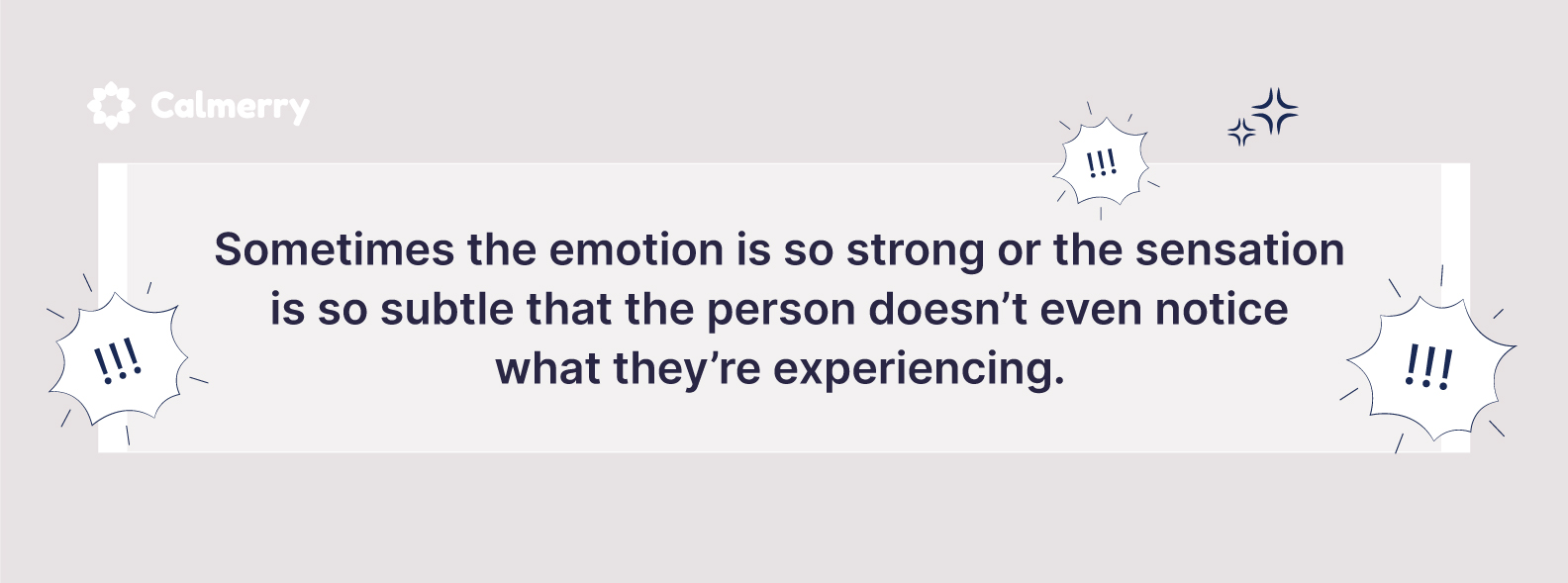
The experience of anger
According to Dr. Paul Eckman, anger is one of the five universal emotions that all humans experience. Anger comes in different intensities, from mild to extreme.
Types of anger include:
- Annoyance
- Frustration
- Exasperation
- Argumentativeness
- Bitterness
- Vengefulness
- Fury
Anger can be likened to a wave that rises, crests, and dissipates back into the ocean. And there are often internal cues associated with a person’s anger, such as:
- Increased heart rate
- Muscle tension
- Fist or jaw clenching
- Tightness in the chest
- Feeling hot
Sometimes the emotion is so strong, or the sensation is so subtle that the person doesn’t even notice what they’re experiencing.
Anger can also be linked to negative thought patterns or thoughts that feed into the emotion, such as self-righteousness, judgments, or blame.
One of the dangers of anger is that it tends to narrow a person’s attention to the point that it becomes difficult to see the big picture or take in any information that could counteract being angry. This is something that you can understand experientially right now in the following exercise.
Open your eyes really wide. As wide as you can. Then, with your eyes wide open, try to feel angry.
Chances are, you can’t.
Now squint your eyes tightly until you can barely see anything around you. See if you can feel curious. Again, you likely can’t. When anger closes a person off to curiosity and compassion while simultaneously compelling them to act, that’s when it can become dangerous.
Another complexity of anger is how it becomes gendered and racialized. This has a range of impacts, including little Black boys being expelled from daycare at a rate that is three times higher than little White boys. It can also impact job prospects and career trajectories.
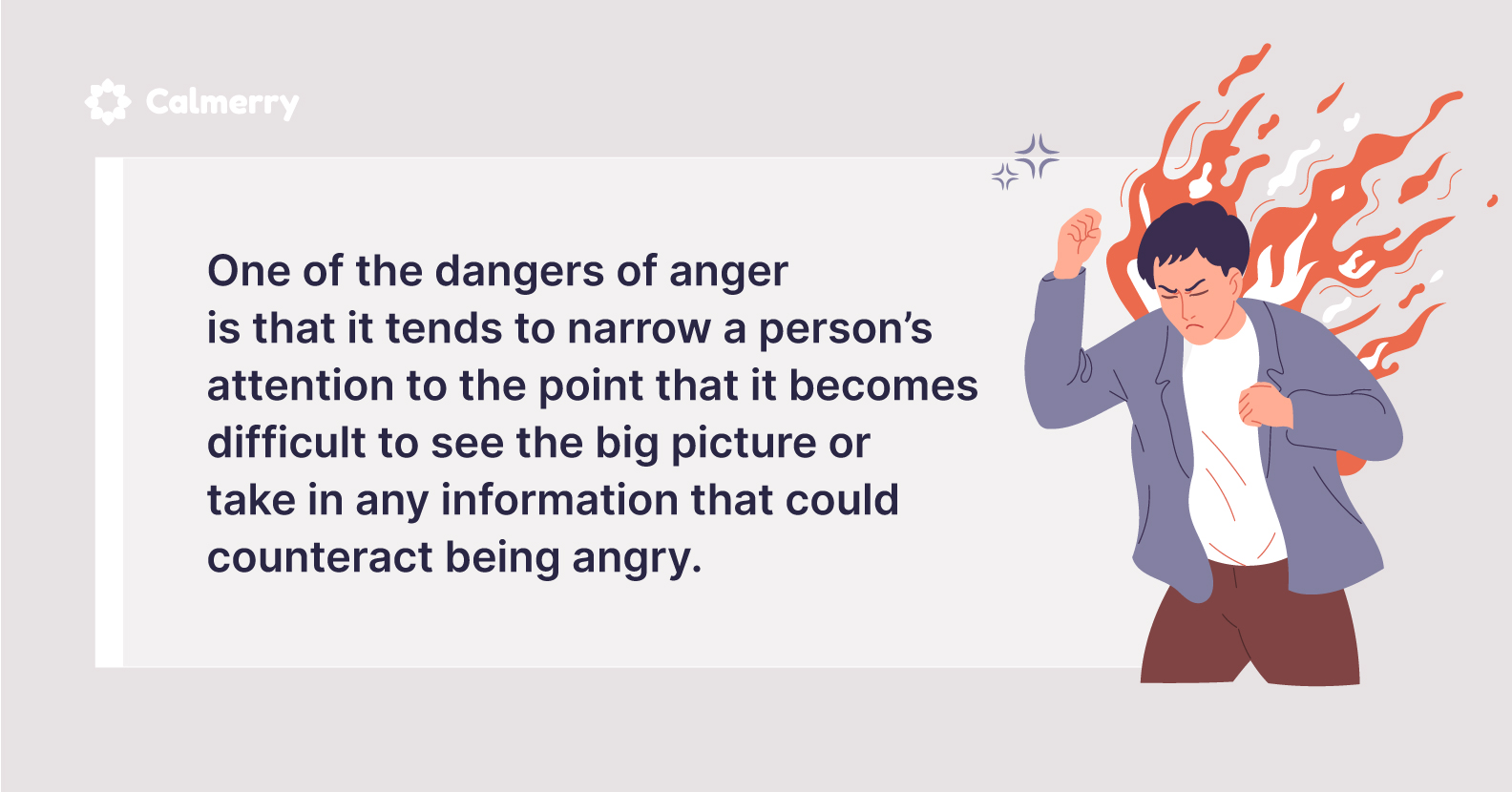
Author and activist Soraya Chemaly noted,
“We teach children to disdain anger in girls and women, and we grow up to be adults that penalize it. So what if we didn’t do that? What if we didn’t sever anger from femininity? Because severing anger from femininity means we sever girls and women from the emotion that best protects us from injustice.”
The Anger Iceberg
Developed by the Gottman Institute, the “Anger Iceberg” is a way of thinking about anger as an outward expression of other emotions that are kept beneath the surface.
When anger is expressed, it is often loud and full of energy. This makes it difficult to spot any underlying feelings that the anger may be defending against.
A person may stomp their feet, scream, or become aggressive. But sometimes, this is just the tip of the iceberg. Beneath the surface, the person might feel a mix of emotions, including:
- Guilt
- Shame
- Jealousy
- Embarrassment
- Fear
- Anxiety
- Sadness
- Loneliness
- Hurt
- Disappointment
- Insecurity
- Pain
- Grief
- Helplessness
Imagine you’re in a relationship, and your partner tells you that you have an anger problem. What if they often ignore what you say, hide the truth, and invalidate your feelings? You respond by getting upset and nagging them, sometimes in front of your friends and family. Everyone labels your partner as “fun and chill” while you’re considered “high-strung and hysterical.”
While in therapy, you recognize that you can find space between your anger and your actions. You begin to see that your anger isn’t the problem. You have legitimate concerns, and your basic needs of being seen and heard are not being met in your relationship.
What’s more, your anger has masked feelings of low self-worth, loneliness, and hopelessness. You may discover a deeply held belief that you don’t deserve to be loved and cared for, which makes you feel a deep sense of anguish.
Your anger has also signaled that there is something important to pay attention to. In uncovering the emotions beneath the anger, you are better able to understand why you feel the way you do and explore healthier and more meaningful ways to channel your energy.
You might decide to start an open and honest conversation with your partner, see a couples therapist, take some time apart, or respond in some other way that makes sense to you. Whatever you choose to do, you’re no longer lost in the thick of your anger.
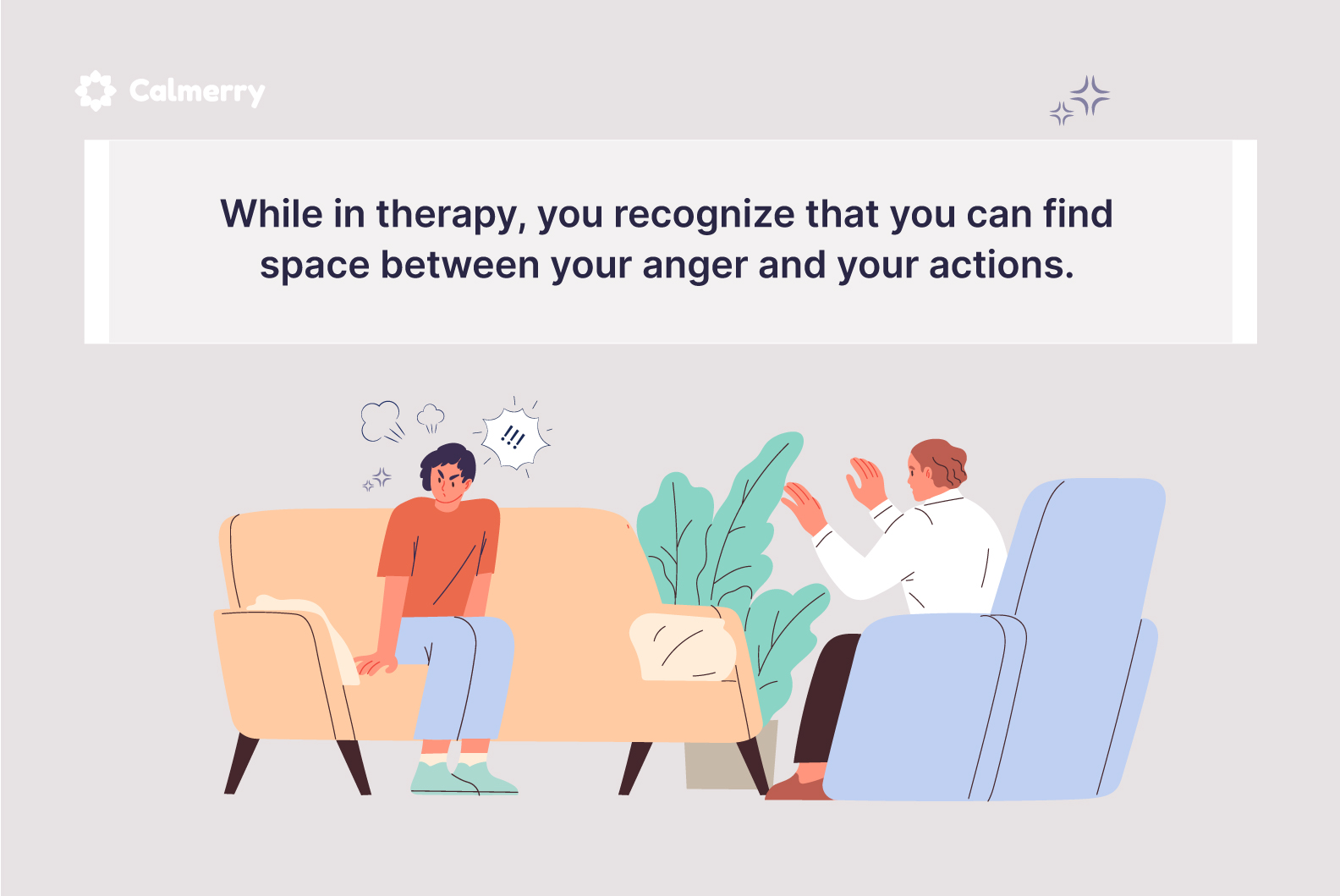
Skills for managing anger
There’s a common myth that anger needs to be expressed through action. Some people recommend punching a pillow or venting to a friend as non-harmful methods of releasing anger.
However, countless studies have debunked this myth. It turns out that much like scratching a mosquito bite, these tactics can offer momentary relief while ultimately inflaming the issue and making it worse in the long run.
There are healthy ways to cope with anger and channel its energy while not letting it interfere with what’s most important to you.
Learn from it
Rather than telling yourself that you shouldn’t be angry or need to be less angry, get curious about your anger. You might say “hmmm” out loud or tell yourself, “Wow, I’m really angry. This must mean there’s something important to me beneath all of this. What is that about?”
If you realize your anger doesn’t have anything to offer you, you may decide to shift your energy elsewhere. For example, you might realize that you’re ruminating on something that you have no control over, and there is absolutely nothing you can do about it. In that case, you may still be able to learn something from your anger. Or you may choose to focus on something that you can have an impact on.
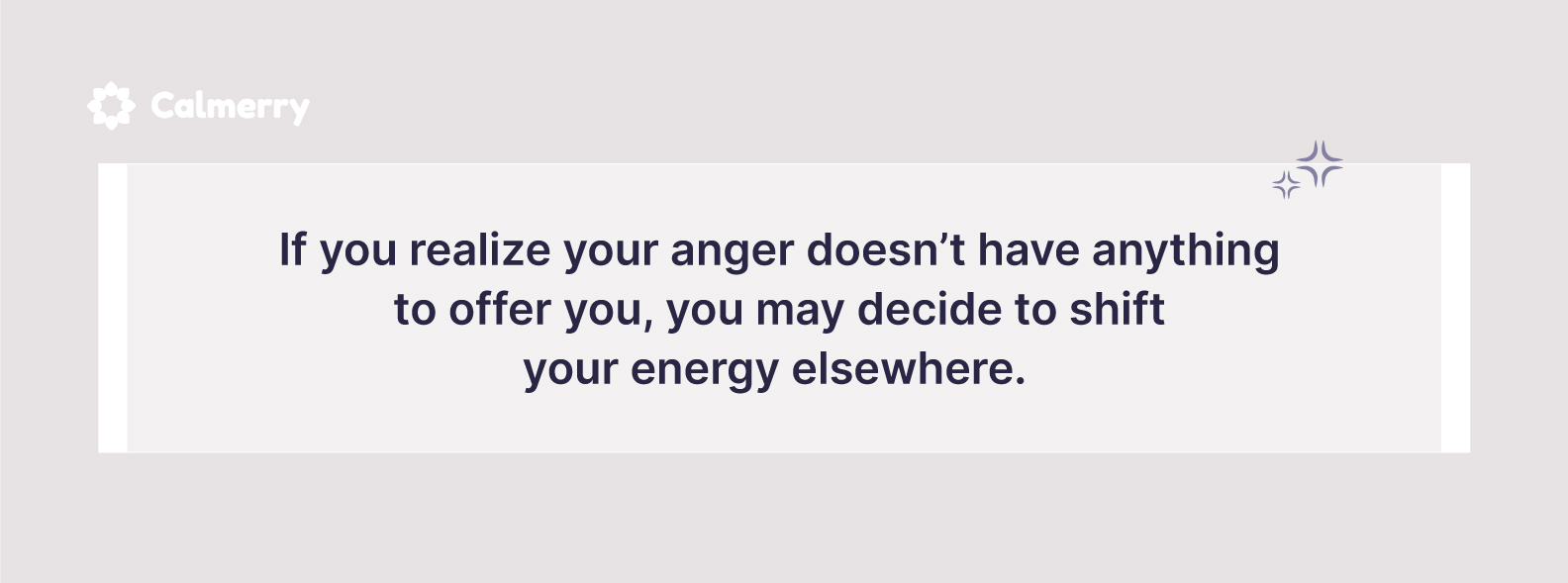
Practice mindfulness
People typically can’t help what they think and feel, but they do have a say in how they respond when anger shows up. Mindfulness practice can support a person in responding with intention instead of reacting impulsively or automatically.
Mindfulness can be practiced through sitting meditation or in everyday tasks such as washing the dishes, communicating with your kids, or walking your dog. Extracted from the Buddhist tradition, mindfulness is about paying attention non-judgementally to the present moment. This can include focusing on the breath, noticing when the mind wanders, and developing a non-judgmental and compassionate stance towards your inner experience.
When it comes to managing anger, researchers have found that mindfulness can be a powerful ally. For example, one study found that participants who practiced mindfulness for three weeks were less likely to engage in vengeful behavior.
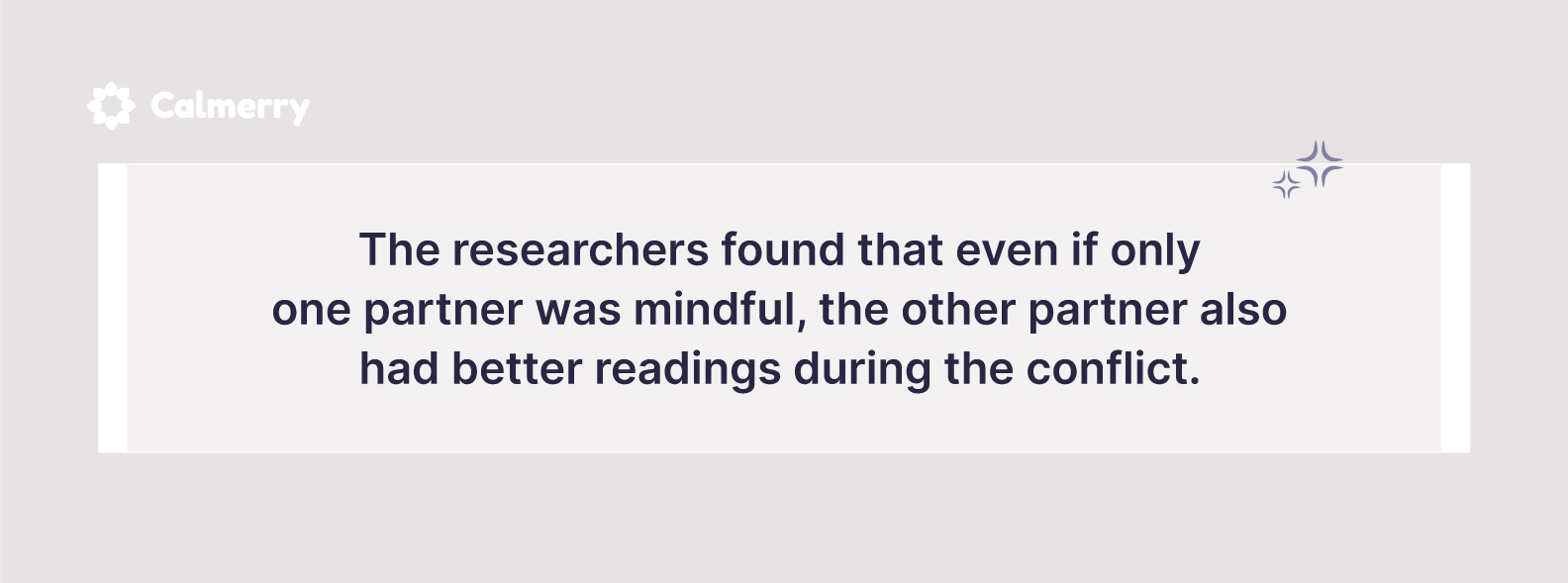
Another study on marital conflict found that people who self-identified as mindful had better heart rate readings and lower blood pressure in tense interactions. In addition, the researchers found that even if only one partner was mindful, the other partner also had better readings during the conflict.
This may point towards a potential ripple effect of mindfulness that can reduce tension and set a calmer tone for communication. This same concept has also been shown in other contexts. One study found that mindful teachers have the potential to improve emotion regulation and reduce psychological distress in their classrooms.
Learn to self-soothe
Self-soothing and regulating your anger are not the same as suppressing it or trying to get rid of it. Instead, it’s about taking gentle care and tending to yourself when you feel distressed.
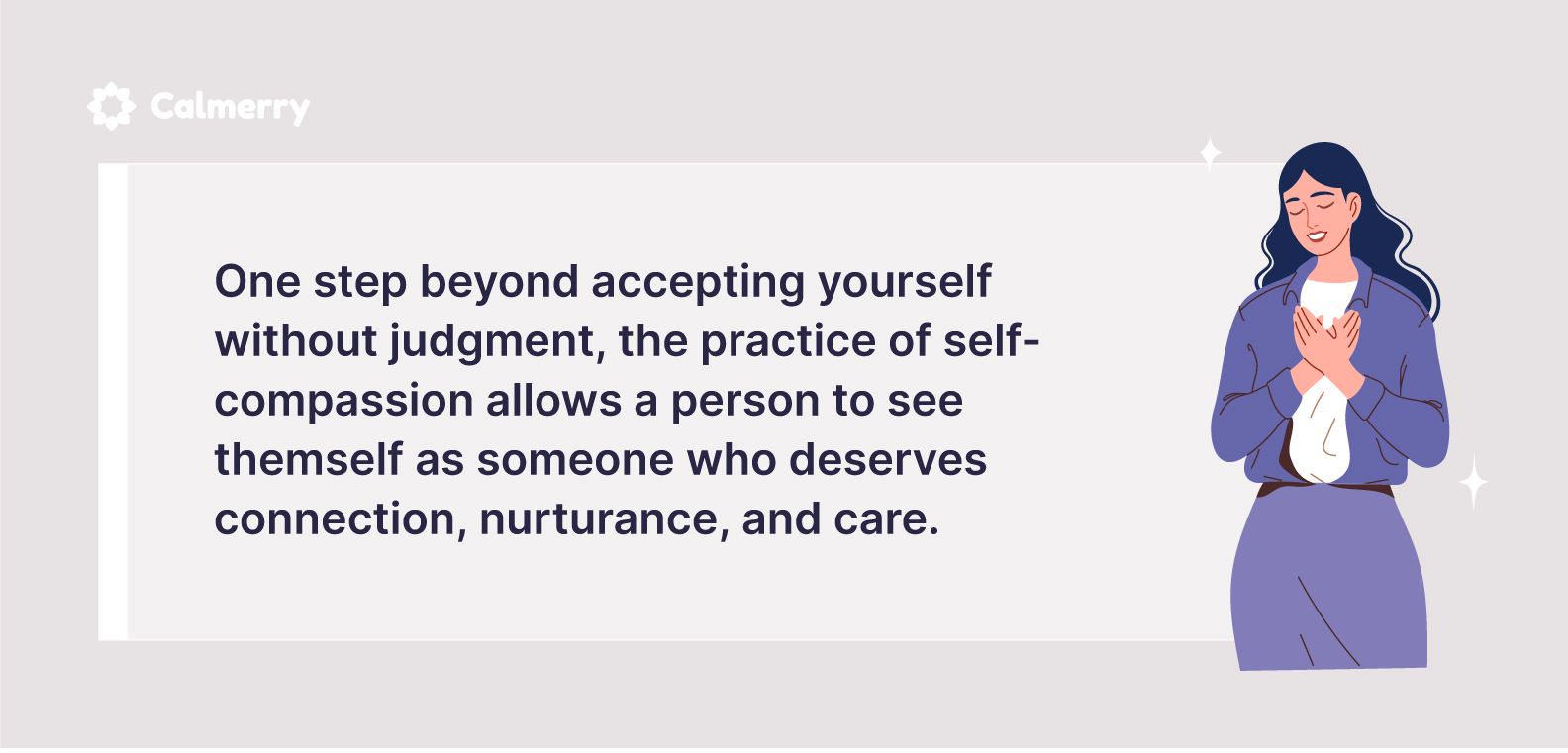
While there are some general things that you can do to improve your mental health, including getting enough sleep, spending time in nature, and journaling, there’s no one right way to self-soothe. It’s really about what works for you. For one person, it might be taking a walk with a friend, and for another, it might be playing an instrument or dancing to their favorite song.
Self-compassion can also help with self-soothing. One step beyond accepting yourself without judgment, the practice of self-compassion allows a person to see themself as someone who deserves connection, nurturance, and care.
Talk to your therapist
You don’t need to have a diagnosable mental health disorder to benefit from therapy. If you find yourself losing your temper on a regular basis or getting knocked over by your anger, consider reaching out to a mental health professional. If you prefer, you can connect to a therapist online, from the comfort of your own space.
When you’re looking for a therapist, try to find someone who has specific experience with anger management. In therapy, you can explore what’s beneath the tip of your anger iceberg, learn how to experience your anger in a healthy way, and recognize what you can learn from it while continuing to do what matters to you.
online therapy
live video session



